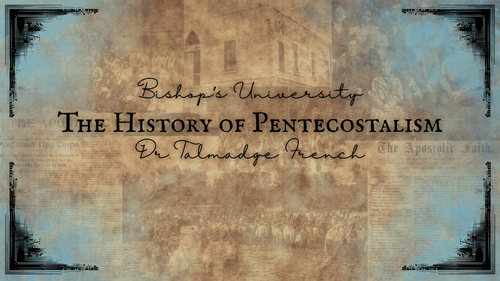Registration Fee:
$50.00
Class Times:
August 20 (Saturday). 3:00 PM - 4:45 PM
September 13 (Saturday), 3:00 PM - 4:45 PM
September 20 (Saturday), 3:00 PM - 4:45 PM
September 27 (Saturday), 3:00 PM - 4:45 PM
October 11 (Saturday), 3:00 PM - 4:45 PM
October 18 (Saturday), 3:00 PM - 4:45 PM
Instructor:
Bishop, Dr. Talmadge L. French
Course Description:
This six-week accelerated course offers an in-depth exploration of the origins, development, and global impact of the Pentecostal movement. Taught by esteemed Pentecostal theologian and historian Dr. Talmadge L. French, the course traces the dynamic evolution of Pentecostalism—from its roots in 19th-century Holiness movements and the Topeka Outpouring, through the Azusa Street Revival, to its worldwide influence in the modern era.
A central focus will be placed on Apostolic and Oneness Pentecostalism, examining its doctrinal distinctives, ecclesial developments, and especially its unique role in shaping interracial Christian fellowship during the early 20th century. Students will engage with primary historical texts, theological debates, and case studies that illuminate Pentecostalism’s explosive growth and cultural relevance.
Required Textbook:
Early Interracial Oneness Pentecostalism: G. T. Haywood and the Pentecostal Assemblies of the World (1901–1931) by Dr. Talmadge L. French
Note:
This textbook is included in the cost of the course and will be provided to all enrolled students.
Topics Covered Include:
Learning Outcomes:
By the conclusion of the course, students will be able to:
Format:
This is an intensive, discussion-driven seminar featuring weekly lectures, guided readings, and historical-theological reflection. Students will complete a weekly discussion and response to the course content.
$50.00
Class Times:
August 20 (Saturday). 3:00 PM - 4:45 PM
September 13 (Saturday), 3:00 PM - 4:45 PM
September 20 (Saturday), 3:00 PM - 4:45 PM
September 27 (Saturday), 3:00 PM - 4:45 PM
October 11 (Saturday), 3:00 PM - 4:45 PM
October 18 (Saturday), 3:00 PM - 4:45 PM
Instructor:
Bishop, Dr. Talmadge L. French
Course Description:
This six-week accelerated course offers an in-depth exploration of the origins, development, and global impact of the Pentecostal movement. Taught by esteemed Pentecostal theologian and historian Dr. Talmadge L. French, the course traces the dynamic evolution of Pentecostalism—from its roots in 19th-century Holiness movements and the Topeka Outpouring, through the Azusa Street Revival, to its worldwide influence in the modern era.
A central focus will be placed on Apostolic and Oneness Pentecostalism, examining its doctrinal distinctives, ecclesial developments, and especially its unique role in shaping interracial Christian fellowship during the early 20th century. Students will engage with primary historical texts, theological debates, and case studies that illuminate Pentecostalism’s explosive growth and cultural relevance.
Required Textbook:
Early Interracial Oneness Pentecostalism: G. T. Haywood and the Pentecostal Assemblies of the World (1901–1931) by Dr. Talmadge L. French
Note:
This textbook is included in the cost of the course and will be provided to all enrolled students.
Topics Covered Include:
- Theological roots in Wesleyan-Holiness traditions
- The Topeka and Azusa Street Revivals
- Racial dynamics and reconciliation in early Pentecostalism
- Formation and theology of the Oneness movement
- Key figures such as G.T. Haywood and the PAW
- Pentecostalism’s global spread in the 20th and 21st centuries
- Contemporary implications for worship, mission, and doctrine
Learning Outcomes:
By the conclusion of the course, students will be able to:
- Articulate major historical developments within the Pentecostal movement
- Analyze the significance of Oneness theology and its racial implications
- Interpret and critique primary sources in Pentecostal history
- Assess Pentecostalism’s enduring theological and global impact
Format:
This is an intensive, discussion-driven seminar featuring weekly lectures, guided readings, and historical-theological reflection. Students will complete a weekly discussion and response to the course content.

